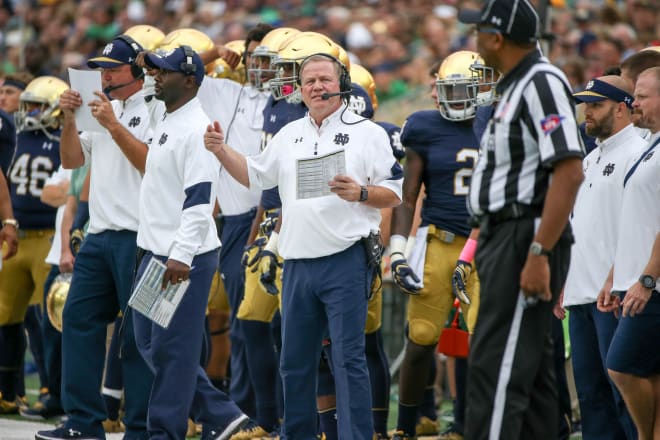Timeout Change Helps Clinch Notre Dame Victory On Final Play

For many a Notre Dame faithful, yesterday’s 30-27 victory over Miami might have elicited a dreaded sense of déjà vu in the closing minute.
Last year the 10-1 Fighting Irish scored with 30 seconds left in the game to take a 36-35 lead at Stanford.
This weekend, it kicked the field goal against the Hurricanes to move ahead with exactly 30 seconds remaining again.
Last year, the Cardinal, after the Irish kickoff, took possession at its 27-yard line and marched 45 yards in five plays to kick the game-winning 45-yard field goal as time expired.
This time, Miami seemed headed toward at least putting the game into overtime when it took possession at its 25 and completed 14- and eight-yard passes on its first two plays. It had third-and-2 at its 47 with 13 seconds remaining, time enough for maybe two quick passes (like the first two) to set up kicker Michael Badgley for, at worst, a 50-to-57- yard attempt. Both Miami head coach Mark Richt and Notre Dame boss Brian Kelly deemed it plausible.
“If we got to [Notre Dame’s] 40, he can make that,” Richt said of needing to go maybe only 13 yards in the next play or two, with no
“They have an outstanding field goal kicker,” Kelly agreed. “And the cliff for us was the 40-yard line. In other words, we didn't want to give up any more room, other than the 40-yard line, which was only about 12, 13 yards.”
So on third down, Richt dialed up a play that, in its skeletal version that was run, was easily going to pick up that yardage, and then some, against a prevent-type defense. However, Kelly, in the nick of time, called timeout right before the snap to change his coverage and go to a press look.
“We didn't like what [defense] we were in, that's why I used the timeout,” Kelly said. “And generally, you're taking that timeout because you don't feel comfortable … The coverage that we had called, I felt like we may give up a little bit too much yardage.
“So, we decided to call a timeout and change and tighten the coverage up. And it, obviously, made a difference in what their play call was versus what we had originally called defensively.”
After the timeout, Richt wasn’t certain whether Notre Dame had changed its coverage, but he thought “it looked pretty close to the same as what they had played before.”
Nevertheless, changing from a prevent look limited the cushion to the Miami receivers and gave junior Mike linebacker Nyles Morgan the time to blitz effectively and record the fifth and final Notre Dame sack on the afternoon to run out the clock (Miami had no timeouts remaining).
“I had called a play before the timeout that I wish I'd have called again — I don't know if it would have mattered in regard to protection,” Richt said. “There's a play I would have called that would have given us a better chance to get [quarterback Brad Kaaya] throwing on rhythm and having a shot. But when they called timeout, I thought they were going to change coverage.
“I was reacting to the fact that I thought they might run more of a true prevent defense on that one.”
Thanks to the last-second timeout and adjustment, the Irish did not — and it helped prevent a possible overtime, and maybe even another defeat.